U.S. civil rights pioneer, congressman John Lewis dies
WASHINGTON (Reuters) - John Lewis, a pioneer of the civil rights movement and long-time member of the U.S. House of Representatives, died on Friday.
Lewis, a member of Congress from Atlanta who had announced in December that he had advanced pancreatic cancer, was 80.
“He loved this country so much that he risked his life and his blood so that it might live up to its promise,” former President Barack Obama said in a statement. “And through the decades, he not only gave all of himself to the cause of freedom and justice, but inspired generations that followed to try to live up to his example.”
John Lewis, U.S. congressman and sharecropper's son, was civil rights hero
Former U.S. President Bill Clinton and former Secretary of State Hillary Clinton in a joint statement, “We have lost a giant. John Lewis gave all he had to redeem America’s unmet promise of equality and justice for all, and to create a place for us to build a more perfect union together.”
House Speaker Nancy Pelosi called Lewis “a titan of the civil rights movement whose goodness, faith and bravery transformed our nation.”
Lewis was a protege of the Rev. Martin Luther King Jr., whom he met after writing to him when Lewis was just 18. He was the last surviving speaker from the 1963 March on Washington, having stood beside King when he made his “I Have a Dream” speech.
Lewis kept up the fight for civil rights and human rights until the end of his life, inspiring with others with calls to make “Good Trouble.”
In 2016, Lewis led a “sit-in” by House Democrats to demand a vote on gun regulations. He made his last public appearance last month, as protests for racial justice swept the United States and the world.
Using a cane, Lewis walked with Washington Mayor Muriel Bowser on a street by the White House that Bowser had just renamed Black Lives Matter Plaza. It had just been dedicated with a large yellow mural - large enough to be seen from space - reading “Black Lives Matter.”
Tributes quickly began pouring in from other politicians, Lewis’ fellow Democrats and Republicans.
The Republican Majority Leader of the U.S. Senate, Mitch McConnell, said Lewis had a place “among the giants of American history” even before he was elected to Congress, noting his rise from a family of sharecroppers in segregated Alabama.
“The Senate and the nation mourn the loss of Congressman John Lewis, a pioneering civil rights leader who put his life on the line to fight racism, promote equal rights, and bring our nation into greater alignment with its founding principles,” McConnell said.
“John Lewis was an icon who fought with every ounce of his being to advance the cause of civil rights for all Americans,” said Senator Kamala Harris, the first African American to represent California in the Senate, on Twitter. “I’m devastated for his family, friends, staff - and all those whose lives he touched.
Reporting by Patricia Zengerle in Washington; Additional reporting by Trevor Hunnicutt in New York, Richard Cowan in Washington and Kanishka Singh in Bengaluru; Editing by William Mallard and Gerry Doyle
John Lewis, congressman and civil rights icon, dies at 80
Lewis, a close friend of Martin Luther King Jr., battled pancreatic cancer.
18 July 2020
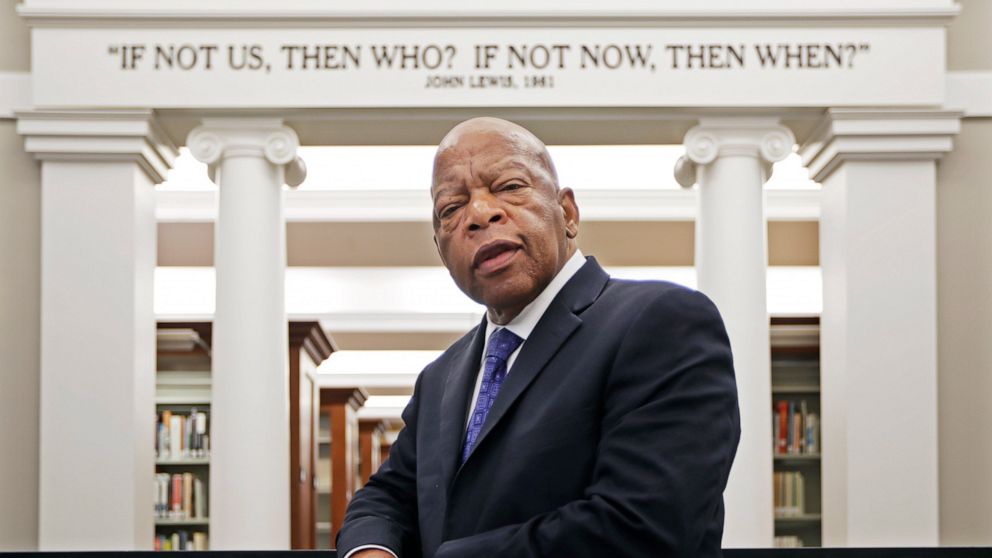
Civil rights icon Rep. John Lewis dead at 80
Lewis was an organizer on the March on Washington in 1963 and served in Congress for more than three decades.
Rep. John Robert Lewis, a Georgia Democrat and civil rights icon, died Friday. He was 80 years old.
Lewis passed seven months after a routine medical visit revealed that he had stage 4 pancreatic cancer. House Speaker Nancy Pelosi and the Congressional Black Caucus confirmed the news of his death.
Known as the "conscience of the U.S. Congress," Lewis continually represented Georgia's 5th Congressional District, which includes most of Atlanta, since taking office in 1987. His cancer diagnosis in December 2019 did not interrupt that streak.
"So I have decided to do what I know to do and do what I have always done: I am going to fight it and keep fighting for the Beloved Community. We still have many bridges to cross," he said in a statement at the time.
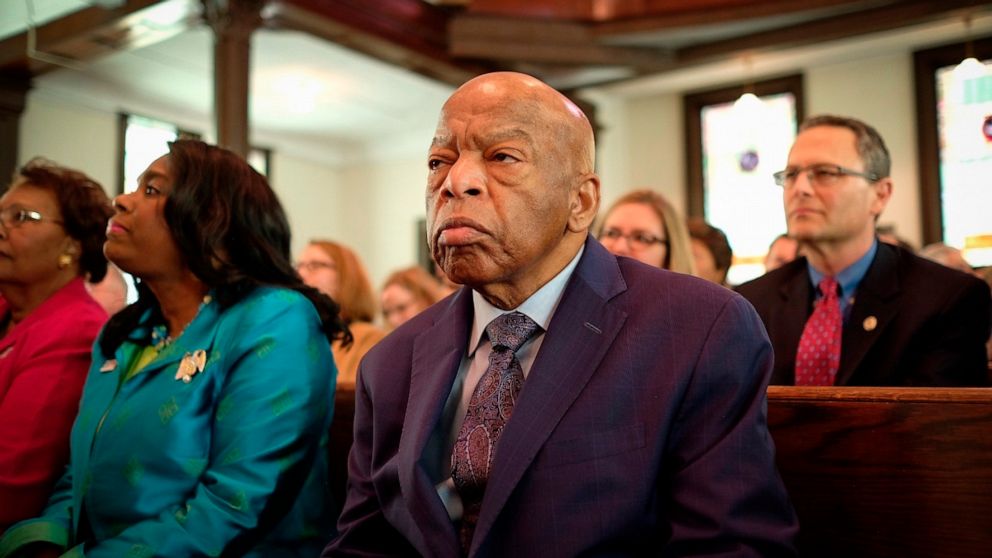
This image released by Magnolia Pictures shows Rep. John Lewis in a scene from "John Lewis: Good Trouble."This image released by Magnolia Pictures shows Rep. John Lewis in a scene from "John Lewis: Good Trouble."Ben Arnon/Magnolia Pictures via AP
"John Lewis was a titan of the civil rights movement whose goodness, faith and bravery transformed our nation – from the determination with which he met discrimination at lunch counters and on Freedom Rides, to the courage he showed as a young man facing down violence and death on Edmund Pettus Bridge, to the moral leadership he brought to the Congress for more than 30 years," Pelosi said in a statement.
Lewis, who was born on Feb. 21, 1940 to sharecroppers in Troy, Alabama, attended segregated public schools and counted the Montgomery Bus Boycott and Dr. Martin Luther King Jr.'s radio broadcasts as inspiration for his work as an activist.
At 18, he wrote a letter to King, who responded by purchasing a round-trip bus ticket to Montgomery for Lewis so they could meet.
"Dr. King, I am John Robert Lewis," he recalled saying to King. "And that was the beginning."
MORE: Outpouring of support follows Rep. John Lewis' cancer diagnosis
Lewis wasted no time organizing, quickly finding himself on the front lines of the civil rights movement.
As a student at Fisk University, he led numerous demonstrations in Nashville against racial segregation, including sit-ins at segregated lunch counters as part of the Nashville Sit-ins.
Starting in 1961, he took part in a series of demonstrations that became known as the Freedom Rides, in which he and other activists -- Black and white -- rode together in buses through the South to challenge the region's lack of enforcing a Supreme Court ruling that deemed segregated public bus rides unconstitutional. Upon stopping, the activists on these rides often were arrested or beaten, Lewis included.
In his second-to-last tweet, just 10 days ago, Lewis tweeted about the 59th anniversary of his release from jail after being arrested in Jackson, Mississippi, for using a white restroom during a Freedom Ride.
59 years ago today I was released from Parchman Farm Penitentiary after being arrested in Jackson, MS for using a so-called "white" restroom during the Freedom Rides of 1961. pic.twitter.com/OUfgeaNDOm— John Lewis (@repjohnlewis) July 7, 2020
During a stop in Rock Hill, South Carolina, Lewis was attacked by two men who hit him in the face and kicked him in the ribs, according to Smithsonian Magazine. In an interview decades later, he said he was undeterred.
"We knew our lives could be threatened, but we had made up our minds not to turn back," he said.
MORE: Rep. John Lewis: A brief history of the civil rights leader
He was the youngest person to speak at the 1963 March on Washington, an event he helped organize as the chairman of the Student Nonviolent Coordinating Committee. The rally, at which King famously delivered his "I Have a Dream" speech, drew more than 200,000 attendees.
MORE: The life of civil rights leader, John Lewis in images
And in the winter of 1965, in what would become known as "Bloody Sunday," Lewis, alongside fellow civil rights leader Hosea Williams, was in the process of leading hundreds of demonstrators in a march for voting rights from Selma to Montgomery when they were greeted by a "sea of blue" of Alabama state troopers, Lewis said. The troopers beat and tear-gassed the demonstrators after ordering them to disperse.
One of those troopers fractured Lewis's skull, scarring his head for the rest of his life.
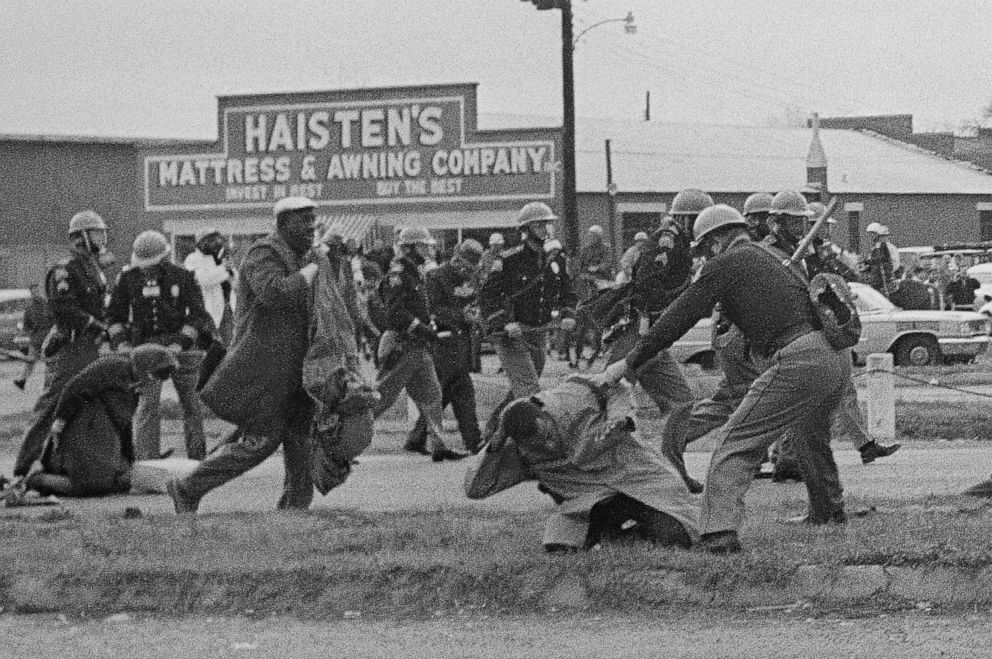
In this March 7, 1965, file photo, state troopers swinging billy clubs to break up a civil rights voting march in Selma, Ala. John Lewis, chairman of the Student Nonviolent Coordinating... moreIn this March 7, 1965, file photo, state troopers swinging billy clubs to break up a civil rights voting march in Selma, Ala. John Lewis, chairman of the Student Nonviolent Coordinating Committee, in the foreground, is being beaten by a state trooper. Lewis, a future U.S. Congressman sustained a fractured skull.AP Photo, File
"I thought I saw death," Lewis later said.
Since then, Lewis has retraced the steps from those day's events nearly every year in what has become known as the Alabama Civil Rights Pilgrimage.
Lewis was elected to the Atlanta City Council in 1981 and then to Congress, representing Georgia's 5th District in 1986. He has served on the Ways & Means Committee and is head of the Oversight Subcommittee.
"The world has lost a legend; the civil rights movement has lost an icon, the City of Atlanta has lost one of its most fearless leaders, and the Congressional Black Caucus has lost our longest serving member," the caucus said in a statement. "The Congressional Black Caucus is known as the Conscience of the Congress. John Lewis was known as the conscience of our caucus. A fighter for justice until the end, Mr. Lewis recently visited Black Lives Matter Plaza in Washington DC. His mere presence encouraged a new generation of activist to 'speak up and speak out' and get into 'good trouble' to continue bending the arc toward justice and freedom."
A published author, Lewis co-authored a graphic novel trilogy "MARCH" about the civil rights movement, a project that garnered the National Book Award among others.
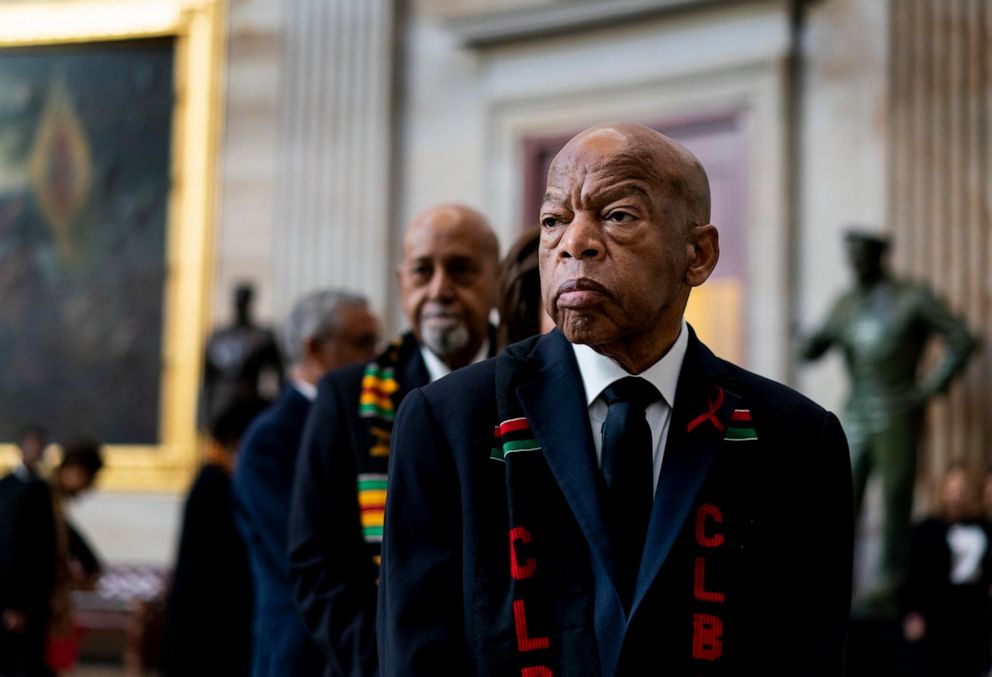
In this Oct. 24, 2019 file photo, Rep. John Lewis, D-Ga., prepares to pay his respects to Rep. Elijah Cummings, D-Md., who lies in state during a memorial service at the U.S. Capitol Hill in Washington.In this Oct. 24, 2019 file photo, Rep. John Lewis, D-Ga., prepares to pay his respects to Rep. Elijah Cummings, D-Md., who lies in state during a memorial service at the U.S. Capitol Hill in Washington.Melina Mara/The Washington Post via AP, Pool, File
Lewis was never shy in his criticism of President Donald Trump, skipping his inauguration and first State of the Union address and calling him a "racist" in a January 2018 interview on "This Week with George Stephanopoulos."
"George, I don't think there's any way that you can square what the president said with the words of Martin Luther King Jr.," the Georgia congressman said, in reaction to Trump's alleged reference to not wanting immigrants from "s--hole" countries. "It's just impossible ... It's unbelievable. It makes me sad. It makes me cry.”
MORE: Civil rights legend Rep. John Lewis says he thinks Trump 'is a racist'
President Barack Obama awarded Lewis the Presidential Medal of Freedom in 2011 for his lifetime of advocacy and activism.
During that February ceremony, Obama said of Lewis: "And generations from now, when parents teach their children what is meant by courage, the story of John Lewis will come to mind -- an American who knew that change could not wait for some other person or some other time; whose life is a lesson in the fierce urgency of now."
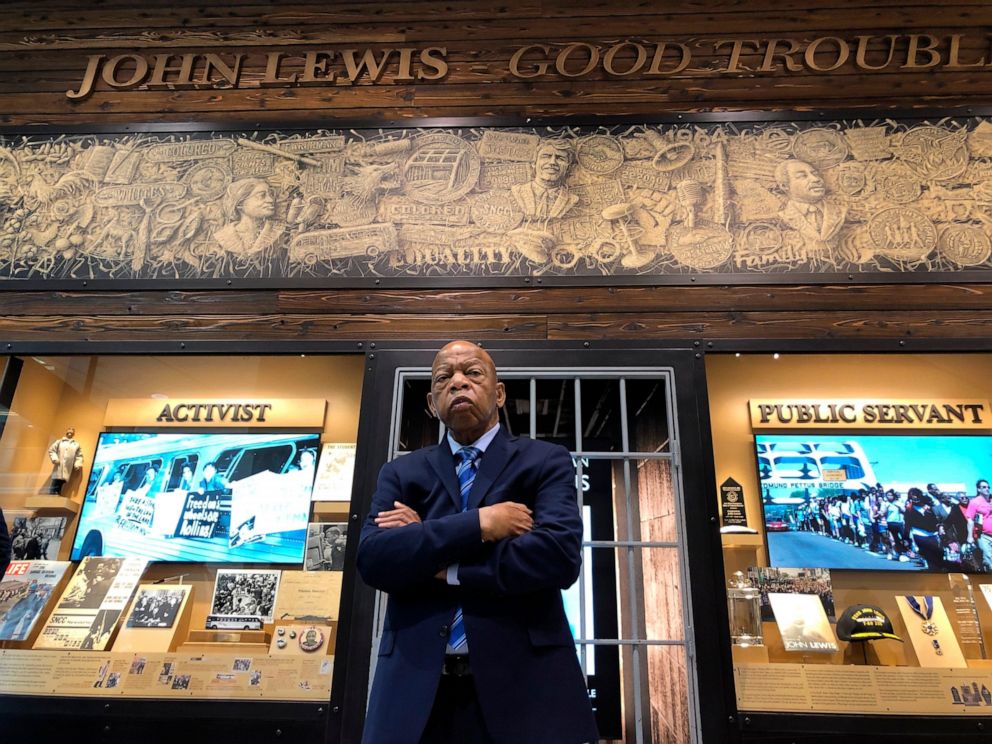
This image released by Magnolia Pictures shows Rep. John Lewis in a scene from "John Lewis: Good Trouble."This image released by Magnolia Pictures shows Rep. John Lewis in a scene from "John Lewis: Good Trouble."Ben Arnon/Magnolia Pictures via AP
Last month, at a town hall with Obama discussing the racial protests across the country following the death of George Floyd, he reflected on his emotions while protesting during the civil rights movement.
"I have been beaten on the bridge, I thought I was so dead. I thought I was going to die,” Lewis said.
"I believe it was the grace of God, and praying witnesses that helped save me, so today I feel more than lucky, more than blessed to see the changes that are occurring to live to see a young man, a young friend like Barack Obama, become president of the United States of America was worth the pain," he added.
Lewis also offered praise for young people who had come together from all walks of life to join in protests.
"They're going to help redeem the soul of America, and save our country, and maybe even save the planet," he said.
John Lewis, U.S. congressman and sharecropper's son, was civil rights hero
Will Dunham
WASHINGTON (Reuters) - John Lewis, who died on Friday at age 80, was a hero of the U.S. civil rights movement of the 1960s who endured beatings by white police and mobs and played an outsized role in American politics for 60 years.
FILE PHOTO: U.S. Rep. John Lewis (D-GA) waves after he speaks at the ceremony at the Lincoln Memorial honoring the 50th anniversary of the 1963 March on Washington, August 24, 2013. Thousands of marchers were expected in Washington, D.C. on Saturday to commemorate the 50th anniversary of the Rev. Martin Luther King Jr.'s "I have a dream" speech and to urge action on jobs, voting rights and gun violence. REUTERS/Larry Downing/File Photo
Lewis, an Alabama sharecropper’s son elected in 1986 as a Democrat to the U.S. House of Representatives from Georgia, died after a battle with pancreatic cancer.
A protege of civil rights icon Martin Luther King Jr., Lewis led sit-ins to integrate all-white lunch counters, was one of the original “Freedom Riders” who integrated buses, and suffered a skull fracture while demonstrating for Black voting rights in a savage beating by a nightstick-wielding white Alabama state trooper during an incident now called “Bloody Sunday.”
Lewis was just 18 when he first met King and went on to play a vital role in the civil rights movement that strove for equality for Blacks in an America grappling with racial bigotry and segregation, particularly in the South.
As a congressman, Lewis tangled with President Donald Trump starting even before Trump took office. Lewis in January 2017 said he did not view Trump as a “legitimate” president because of Russian meddling in the 2016 election to boost his candidacy. Trump drew criticism even from fellow Republicans when he called Lewis “all talk” and “no action.”
Lewis was present at many of the civil rights movement’s seminal moments, and was the youngest speaker at the 1963 March on Washington where Martin Luther King delivered his “I Have a Dream” speech, hoping for a land where Blacks “will not be judged by the color of their skin but by the content of their character.”
Lewis, the last surviving speaker at that speech, maintained the fight for civil rights until the end of his life. He made his last public appearance in June, as protests for racial justice swept the United States and the world.
Using a cane, he walked with Washington, D.C., Mayor Muriel Bowser on a street by the White House that Bowser had just renamed Black Lives Matter Plaza, which had just been dedicated with a large yellow mural - large enough to be seen from space - reading “Black Lives Matter.”
Amid a national movement to abolish Confederate monuments and symbols, calls have grown rename the bridge in Selma, Alabama, where Lewis was brutally beaten during a 1965 voting rights march, for Lewis. It is named for Edmund Pettus, who fought in the Confederate Army and robbed African-Americans of their right to vote after Reconstruction.
Long before the March on Washington, Lewis helped found the Student Nonviolent Coordinating Committee (SNCC), which became a prominent civil rights group, and served as its president for three years.
He proved he was willing to risk his life for the cause of civil rights and non-violent protest and organized the first lunch-counter sit-ins demanding service for Blacks at whites-only eateries.
In 1960, at a whites-only diner in Nashville, Tennessee, a white waitress dumped cleaning powder down his back and water on his food. He was beaten by whites in South Carolina and Alabama during 1961 anti-segregation bus tours called Freedom Rides. And he suffered further injuries during “Bloody Sunday” in 1965 in Selma.
“I thought I was going to die a few times,” he said in a 2004 interview, mentioning Selma and a 1961 mob beating at a bus station in Montgomery, Alabama. “I thought I saw death, but nothing can make me question the philosophy of non-violence.”
Barack Obama, the first Black U.S. president, awarded Lewis the presidential medal of freedom, America’s highest civilian honor, in 2011.
“Generations from now, when parents teach their children what is meant by courage, the story of John Lewis will come to mind - an American who knew that change could not wait for some other person or some other time, whose life is a lesson in the fierce urgency of now,” Obama said a White House ceremony.
Lewis was born on Feb. 21, 1940, in Troy, Alabama, when Blacks faced segregation in all public facilities and were effectively barred from voting in the U.S. South - where Black slavery ended only due to the 1861-1865 Civil War - thanks to the notorious “Jim Crow” laws.
‘I FELT SO FREE’
Lewis plunged into the civil rights movement as a student at Fisk University in Nashville, where he organized the sit-ins at segregated lunch counters.
“The Nashville sit-ins became the first mass arrest in the sit-in movement, and I was taken to jail,” Lewis said.
“I’ll tell you, I felt so liberated. I felt so free. I felt like I had crossed over. I think I said to myself, ‘What else can you do to me? You beat me. You harassed me. Now you have placed me under arrest. You put us in jail. What’s left? You can kill us?’”
The “Bloody Sunday” attack took place when segregationist Alabama Governor George Wallace directed police to use night sticks and tear gas to stop the peaceful march for voting rights led by Lewis and others.
As hundreds of Black protesters crossed the Edmund Pettus Bridge, state troopers, many on horseback, waded into the crowd swinging billy clubs. Lewis was beaten so badly that his scars were visible decades later when he served in Congress.
The horrific nature of the event inspired action in Washington. President Lyndon Johnson days later demanded that Congress approve legislation removing barriers to Black voting. Lawmakers then passed the landmark Voting Rights Act of 1965.
In a moving postscript to his protest years, Elwin Wilson, a white man who assaulted Lewis at a bus station in Rock Hill, South Carolina, in 1961, traveled to Washington in 2009 to apologize tearfully to Lewis, who forgave him.
“That’s what the movement was always about - to have the capacity to forgive and move toward reconciliation,” Lewis told the New York Times in 2013 after Wilson died at age 76.
After leaving SNCC in 1966, Lewis worked for community organizations. He later was Democratic President Jimmy Carter’s choice to head the federal volunteer program ACTION and he was elected to the Atlanta City Council in 1981.
Lewis lost his first run for the House in 1977 to Democrat Wyche Fowler in the campaign to replace Andrew Young, the first Black elected to Congress from Georgia in modern times. Carter had picked Young to be U.S. ambassador to the United Nations.
When Fowler headed to the Senate, Lewis defeated another civil rights figure, Julian Bond, in 1986 for the House seat representing the congressional district encompassing Atlanta.
In the House, he amassed a liberal voting record and was a member of the House Democratic leadership team.
Lewis began the 2008 campaign supporting Hillary Clinton as she faced Obama for the Democratic presidential nomination. After Obama won Georgia’s Democratic primary, Lewis switched allegiance in a key moment of the campaign.
As a congressman in June 2016, Lewis used the non-violent protest tactics he learned from King to help organize a 24-hour sit-in on the House floor to push for gun control legislation following a shooting that killed 49 people at a gay nightclub in Orlando, Florida. The rare protest virtually shut down the chamber.
Lewis had one son with his wife Lillian, who died in 2012.
Reporting and writing by Will Dunham; Additional reporting by Patricia Zengerle in Washington, Trevor Hunnicutt in New York; Editing by Bill Trott, Sonya Hepinstall and William Mallard
DON'T MOURN, ORGANIZE! JOE HILL
(Reuters) - Politicians and activists voiced an outpouring of grief and appreciation for U.S. Representative John Lewis, who died on Friday of pancreatic cancer at age 80.
Here are some of their quotes:
Former U.S. President Barack Obama
“He loved this country so much that he risked his life and his blood so that it might live up to its promise. And through the decades, he not only gave all of himself to the cause of freedom and justice, but inspired generations that followed to try to live up to his example.”
Bernice King, the daughter of civil rights icon Dr. Martin Luther King, Jr.
“Farewell, sir. You did, indeed, fight the good fight and get into a lot of good trouble. You served God and humanity well. Thank you. Take your rest.”
Former U.S. President Bill Clinton and Secretary of State Hillary Clinton
“John Lewis gave all he had to redeem America’s unmet promise of equality and justice for all, and to create a place for us to build a more perfect union together.”
House Speaker Nancy Pelosi
“John Lewis was a titan of the civil rights movement whose goodness, faith and bravery transformed our nation – from the determination with which he met discrimination at lunch counters and on Freedom Rides, to the courage he showed as a young man facing down violence and death on Edmund Pettus Bridge, to the moral leadership he brought to the Congress for more than 30 years.”
Nathan Law, Hong Kong pro-democracy activist and former legislator
“RIP Congressman John Lewis. Thank you for your support. Thank you for your activism. Thank you for your lessons.”
Republican Majority Leader of the U.S. Senate Mitch McConnell
“The Senate and the nation mourn the loss of Congressman John Lewis, a pioneering civil rights leader who put his life on the line to fight racism, promote equal rights, and bring our nation into greater alignment with its founding principles.”
Senator Kamala Harris
“John Lewis was an icon who fought with every ounce of his
being to advance the cause of civil rights for all Americans. I’m devastated for his family, friends, staff - and all those whose lives he touched.”
Stacey Abrams, a Democratic activist and founder of Fair Fight, a voting rights group in Lewis’ home state of Georgia
“Our conscience, he was a griot of this modern age, one who saw its hatred but fought ever towards the light,” said “And never once did he begrudge sharing its beauty. I loved him & will miss him.”
No comments:
Post a Comment